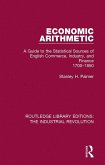George Yerby
The Economic Causes of the English Civil War (eBook, PDF)
Freedom of Trade and the English Revolution
43,95 €
43,95 €
inkl. MwSt.
Sofort per Download lieferbar

22 °P sammeln
43,95 €
Als Download kaufen

43,95 €
inkl. MwSt.
Sofort per Download lieferbar

22 °P sammeln
Jetzt verschenken
Alle Infos zum eBook verschenken
43,95 €
inkl. MwSt.
Sofort per Download lieferbar
Alle Infos zum eBook verschenken

22 °P sammeln
George Yerby
The Economic Causes of the English Civil War (eBook, PDF)
Freedom of Trade and the English Revolution
- Format: PDF
- Merkliste
- Auf die Merkliste
- Bewerten Bewerten
- Teilen
- Produkt teilen
- Produkterinnerung
- Produkterinnerung

Bitte loggen Sie sich zunächst in Ihr Kundenkonto ein oder registrieren Sie sich bei
bücher.de, um das eBook-Abo tolino select nutzen zu können.
Hier können Sie sich einloggen
Hier können Sie sich einloggen
Sie sind bereits eingeloggt. Klicken Sie auf 2. tolino select Abo, um fortzufahren.

Bitte loggen Sie sich zunächst in Ihr Kundenkonto ein oder registrieren Sie sich bei bücher.de, um das eBook-Abo tolino select nutzen zu können.
This book substantiates the link between economic motivations and the political revolution of the mid seventeenth century.
- Geräte: PC
- mit Kopierschutz
- eBook Hilfe
Andere Kunden interessierten sich auch für
![The Economic Causes of the English Civil War (eBook, ePUB) The Economic Causes of the English Civil War (eBook, ePUB)]() George YerbyThe Economic Causes of the English Civil War (eBook, ePUB)44,95 €
George YerbyThe Economic Causes of the English Civil War (eBook, ePUB)44,95 €![Economic Arithmetic (eBook, PDF) Economic Arithmetic (eBook, PDF)]() Economic Arithmetic (eBook, PDF)35,95 €
Economic Arithmetic (eBook, PDF)35,95 €![The History of British Diplomacy in Pakistan (eBook, PDF) The History of British Diplomacy in Pakistan (eBook, PDF)]() Ian TalbotThe History of British Diplomacy in Pakistan (eBook, PDF)43,95 €
Ian TalbotThe History of British Diplomacy in Pakistan (eBook, PDF)43,95 €- -29%11
![A Short History of the Tudors (eBook, PDF) A Short History of the Tudors (eBook, PDF)]() Richard RexA Short History of the Tudors (eBook, PDF)13,95 €
Richard RexA Short History of the Tudors (eBook, PDF)13,95 € ![Africa, Empire and World Disorder (eBook, PDF) Africa, Empire and World Disorder (eBook, PDF)]() A. G. HopkinsAfrica, Empire and World Disorder (eBook, PDF)43,95 €
A. G. HopkinsAfrica, Empire and World Disorder (eBook, PDF)43,95 €![The English Woollen Industry, c.1200-c.1560 (eBook, PDF) The English Woollen Industry, c.1200-c.1560 (eBook, PDF)]() John OldlandThe English Woollen Industry, c.1200-c.1560 (eBook, PDF)45,95 €
John OldlandThe English Woollen Industry, c.1200-c.1560 (eBook, PDF)45,95 €![Henry Bennet, Earl of Arlington, and his World (eBook, PDF) Henry Bennet, Earl of Arlington, and his World (eBook, PDF)]() Henry Bennet, Earl of Arlington, and his World (eBook, PDF)43,95 €
Henry Bennet, Earl of Arlington, and his World (eBook, PDF)43,95 €-
-
-
This book substantiates the link between economic motivations and the political revolution of the mid seventeenth century.
Dieser Download kann aus rechtlichen Gründen nur mit Rechnungsadresse in A, B, BG, CY, CZ, D, DK, EW, E, FIN, F, GR, HR, H, IRL, I, LT, L, LR, M, NL, PL, P, R, S, SLO, SK ausgeliefert werden.
Produktdetails
- Produktdetails
- Verlag: Taylor & Francis eBooks
- Seitenzahl: 432
- Erscheinungstermin: 19. August 2019
- Englisch
- ISBN-13: 9781000507720
- Artikelnr.: 57501906
- Verlag: Taylor & Francis eBooks
- Seitenzahl: 432
- Erscheinungstermin: 19. August 2019
- Englisch
- ISBN-13: 9781000507720
- Artikelnr.: 57501906
- Herstellerkennzeichnung Die Herstellerinformationen sind derzeit nicht verfügbar.
George Yerby took his degree at Birkbeck College, London University in 1986, and has since worked as an historical researcher. He specialises in the economic and political history of the sixteenth and seventeenth centuries. He is the author of People and Parliament: Representative Rights and the English Revolution, published in 2008, and The English Revolution and the Roots of Environmental Change, published in 2016.
Introduction: Recovering the Economic Context of History 1. The Basis of Change: The Early Breach of the Manorial Stasis in England; the Coming of the Commercial Yeoman Farmer; and the Increase of Opportunity-"The Exceeding Lucre They See Grow" 2. Dynamics of Change: The New Shape of Interregional Trading; the Mutual Benefits of Specialisation and Exchange; and the Growth of a National Land Market 3. The Structures of Change: The Displacement of the Open Patterns of Occupation on the Common Lands; the Timing and Effects of Enclosure; the Significance of Consolidation Without Enclosure 4. New Patterns of Work: From Smallholders to Wage Labourers; and the Role of Industrial Activity in Undermining the Commons 5. The Higher Profile of Architectural Form 6. A Changing Ethos: From Conditional to Absolute Property; the Rise of Individualism and a Self-Sustaining Market; and the Growing Demand for a Right of Freedom of Trade from Arbitrary Restraints 7. Economic Roots of Political Change: The Merchant-Gentry Alliance Against Prerogative Customs Dues; the Central, Long-Term Challenge to the Crown-"To Have a Certainty" 8. New Definitions of Good Government: "Parliament" versus "Patent"; the Opposition to Monopolies; Freedom of Trade as the Economic Policy of the Commons; and the Unsatisfied Demand for Parliamentary Legislation 9. Economic Aims of Parliament's Foreign Policy: Elizabeth I as the Embodiment of the National Enterprise; the Dynastic Preference of James I for the National Enemy 10. The Religious War of Charles I Against His Scottish Kingdom; and the People of England "Left Now Only to Expect an Opportunity" 11. The First Revolutionary Measure of the Long Parliament: The Triennial Act of February 1641-a "Course as May Not Be Eluded"; and the Relevance of the Rise of the Gentry 12. The Triumph of Freedom of Trade: The Throwing Down of Monopolies; and the Ending of Prerogative Customs Dues 13. The Support of the Middle Sort: Parliament's Broad Base of Allegiance Among the Substantial Freeholders and the Merchants and Traders in the Commercial Centres-"Which Said Order Is Remaining in the Town Chest" 14. Commercial, Political and Religious Connections in Parliament's West Nottinghamshire Heartland: "To Know a Law and Have a Certainty" 15. A Middle Sort of Aristocracy: William Pierrepont and the Course of the English Revolution 16. The Socio-Economic Limits of the Revolution: Parliament, the People and the Poor; and on Whose Side Were the Levellers? 17. The Economy of the State: The First Fully Capitalist Society
Introduction: Recovering the Economic Context of History 1. The Basis of Change: The Early Breach of the Manorial Stasis in England; the Coming of the Commercial Yeoman Farmer; and the Increase of Opportunity-"The Exceeding Lucre They See Grow" 2. Dynamics of Change: The New Shape of Interregional Trading; the Mutual Benefits of Specialisation and Exchange; and the Growth of a National Land Market 3. The Structures of Change: The Displacement of the Open Patterns of Occupation on the Common Lands; the Timing and Effects of Enclosure; the Significance of Consolidation Without Enclosure 4. New Patterns of Work: From Smallholders to Wage Labourers; and the Role of Industrial Activity in Undermining the Commons 5. The Higher Profile of Architectural Form 6. A Changing Ethos: From Conditional to Absolute Property; the Rise of Individualism and a Self-Sustaining Market; and the Growing Demand for a Right of Freedom of Trade from Arbitrary Restraints 7. Economic Roots of Political Change: The Merchant-Gentry Alliance Against Prerogative Customs Dues; the Central, Long-Term Challenge to the Crown-"To Have a Certainty" 8. New Definitions of Good Government: "Parliament" versus "Patent"; the Opposition to Monopolies; Freedom of Trade as the Economic Policy of the Commons; and the Unsatisfied Demand for Parliamentary Legislation 9. Economic Aims of Parliament's Foreign Policy: Elizabeth I as the Embodiment of the National Enterprise; the Dynastic Preference of James I for the National Enemy 10. The Religious War of Charles I Against His Scottish Kingdom; and the People of England "Left Now Only to Expect an Opportunity" 11. The First Revolutionary Measure of the Long Parliament: The Triennial Act of February 1641-a "Course as May Not Be Eluded"; and the Relevance of the Rise of the Gentry 12. The Triumph of Freedom of Trade: The Throwing Down of Monopolies; and the Ending of Prerogative Customs Dues 13. The Support of the Middle Sort: Parliament's Broad Base of Allegiance Among the Substantial Freeholders and the Merchants and Traders in the Commercial Centres-"Which Said Order Is Remaining in the Town Chest" 14. Commercial, Political and Religious Connections in Parliament's West Nottinghamshire Heartland: "To Know a Law and Have a Certainty" 15. A Middle Sort of Aristocracy: William Pierrepont and the Course of the English Revolution 16. The Socio-Economic Limits of the Revolution: Parliament, the People and the Poor; and on Whose Side Were the Levellers? 17. The Economy of the State: The First Fully Capitalist Society







